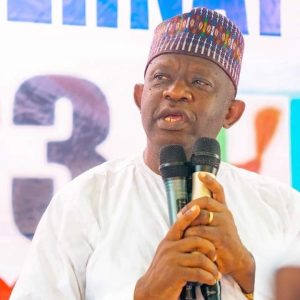Senator Sunday Karimi: Championing Agricultural Reform, Oil Sector Accountability, and Banking Transparency

By Teidi Babatunde Oluwaropo
Senator Sunday Karimi, representing Kogi West Senatorial District in the Nigerian Senate, has established a remarkable legislative track record by sponsoring bills and moving motions that address critical national issues. His legislative focus spans across key sectors such as agriculture, oil and gas, and the financial industry, with the aim of fostering economic development, ensuring transparency, and improving the lives of ordinary Nigerians.
Agricultural Development Bills
Recognizing the importance of agriculture as the backbone of Nigeria’s economy, Senator Karimi has been at the forefront of legislative reforms aimed at revitalizing the sector. One of his notable contributions is the Agricultural Credit Guarantee Scheme Fund (Amendment) Bill 2023. This bill seeks to amend the existing Agricultural Credit Guarantee Scheme Fund Act to enhance farmers’ access to credit facilities. By making financing more accessible, the bill is designed to empower small-scale farmers and agribusinesses to expand production, thereby improving food security and reducing poverty.
In addition, Senator Karimi sponsored the National Fertilizer Quality Control Bill 2023, which aims to regulate the production, distribution, and sale of fertilizers in Nigeria. With proper quality control in place, farmers can access high-quality fertilizers that will boost productivity and ensure higher yields, addressing the perennial challenges of low agricultural output.
The Livestock Development and Management Bill 2023 is another key piece of legislation introduced by Karimi. It focuses on promoting livestock production, processing, and marketing. Given the importance of livestock to Nigeria’s rural economy, this bill aims to formalize and modernize the sector, increasing income for livestock farmers and ensuring the availability of quality animal products in the market.
Lastly, his Agricultural Insurance Commission (Establishment) Bill 2023 seeks to establish a commission that will provide insurance coverage for farmers. This is crucial in mitigating risks associated with climate change, pests, and other unforeseen disasters, ensuring that farmers are not left devastated by losses beyond their control.
Oil Sector Accountability and Natural Resource Governance
Beyond agriculture, Senator Karimi has also been vocal in addressing inefficiencies in Nigeria’s oil and gas sector. His motion on the Probe of Refinery Maintenance Costs brought to light the staggering sum of N11.35 trillion spent on maintaining moribund refineries between 2010 and 2024. He emphasized that despite these colossal expenditures, the refineries remain largely unproductive, calling for accountability and transparency in the management of public resources. This motion aims to ensure that future investments in refinery maintenance are judiciously utilized and deliver value to the Nigerian people.
Karimi has also sponsored other bills related to natural resource governance, which focus on improving the management and regulation of Nigeria’s oil and gas sector. These bills are aimed at strengthening oversight, promoting transparency, and ensuring that the wealth generated from the country’s natural resources benefits its citizens.
Banking Sector Reform
Senator Karimi’s legislative efforts also extend to Nigeria’s banking sector. His Bill to amend the Central Bank (Establishment) Act 2007 seeks to enhance the transparency and accountability of the Central Bank of Nigeria (CBN). The bill proposes key reforms such as criminalizing the use of foreign currency in domestic trade, restricting CBN governors from participating in partisan politics, and reconstituting the CBN board to include representatives from key financial institutions. These reforms are designed to foster greater accountability in the management of Nigeria’s monetary policy.
Conclusion
Through his legislative initiatives, Senator Sunday Karimi demonstrates a deep commitment to addressing Nigeria’s pressing challenges. Whether through reforming agricultural policy, ensuring transparency in oil sector expenditures, or promoting accountability in the banking sector (just to mention a few), Karimi’s work in the Senate reflects a broader vision for a prosperous, well-governed Nigeria.
